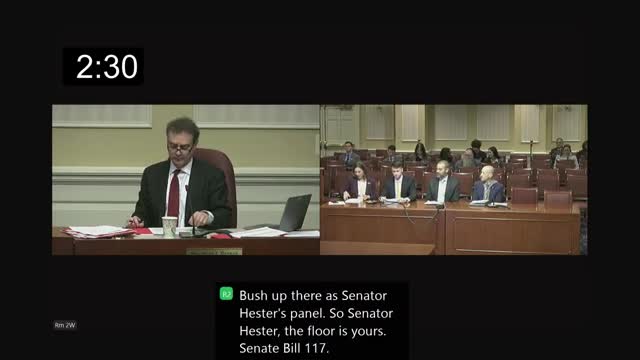Bill would broaden Bay Restoration Fund priorities to reach nitrogen‑impaired waters and aid moderate‑income septic upgrades
Get AI-powered insights, summaries, and transcripts
Subscribe
Summary
Senate Bill 117 would expand and modernize Bay Restoration Fund priorities by adding failing septic systems in nitrogen‑impaired watersheds to the fund's top priorities, authorizing performance‑based reimbursements for higher‑efficiency septic systems, enhancing assistance for moderate‑income homeowners, and changing a fixed eligibility date to a 15‑year rolling cutoff.
Senator Hester presented Senate Bill 117, sponsored at the request of the Maryland Department of the Environment, proposing four updates to the Bay Restoration Fund (BRF) to improve targeting of septic‑system funds and increase flexibility for homeowners.
Alex Butler and Matt Rowe of MDE said the bill would add failing septic systems in nitrogen‑impaired watersheds to the BRF's top priorities (currently the statutory priority is failing systems within the critical area). The bill would permit MDE to set reimbursement rates for Best Available Technology (BAT) septic systems based on measured nitrogen removal efficiency, a performance‑based approach intended to "gently nudge" consumers toward higher‑performing systems while preserving consumer choice.
MDE staff also said SB 117 would give moderate‑income homeowners more leeway to cover expensive items such as drainfield replacements that could otherwise make projects unaffordable, and would replace the fixed 2008 eligibility cutoff with a rolling deadline of 15 years before an application to account for systems reaching the end of their useful life.
Environmental and industry witnesses including Clean Water Action and the Maryland On‑Site Wastewater Professional Association generally supported the bill with technical refinements. Clean Water Action urged clarity about mapping and prioritization to avoid diluting funding availability; industry witnesses cautioned that MDE's proposed BAT ranking needs careful data collection and stakeholder work to avoid eliminating options for consumers and small businesses.
MDE and stakeholders said they were continuing to negotiate technical amendments. Senator Hester and department witnesses asked the committee for a favorable report; no committee vote or final action was recorded in the transcript.
